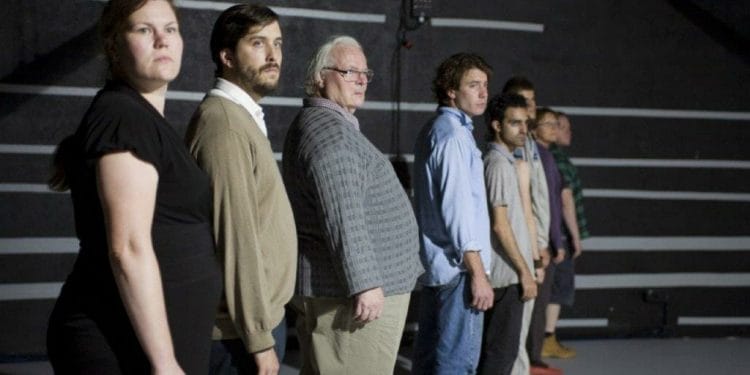 I couldn’t help but be skeptical of 8:8 when I read what it offered me before the performance. My natural cynicism prepared me for something pretentious and differently formatted from traditional pieces of theatre just for the sake of deviating from the norm, as is often the case with these sort of ‘intimate experiences’ disguising themselves as pieces of theatre. I have never been happier to have been proven totally wrong.
I couldn’t help but be skeptical of 8:8 when I read what it offered me before the performance. My natural cynicism prepared me for something pretentious and differently formatted from traditional pieces of theatre just for the sake of deviating from the norm, as is often the case with these sort of ‘intimate experiences’ disguising themselves as pieces of theatre. I have never been happier to have been proven totally wrong.
8:8 is pretty much the entire premise of the show. Eight audience members. Eight performers. The half-hour long social experiment/docudrama sets the tone for the rest of the piece from the very start; compellingly uncomfortable, as the cast stares into the distance for a solid two minutes at least, not saying or doing anything, before they performed a routine of various sequences in which their movements were impacted by the other cast members, perhaps planting the seeds of the apparent theme of unity and connection. Already I began to feel a connection with these people. I noticed physical traits that their bodies exhibited, whether they were intentional or not is a different matter (it’s also worth noting that half of the cast were not professional performers, adding a layer of honesty and humanity to the piece).
The real meat of 8:8 commences when the cast conclude their routine and sit opposite the audience. They each offer facts about themselves and their life stories, concluding each fact with confirmation on whether or not the fact is true. I found this part of the show confusing and slightly difficult to understand the point of it, but can only imagine it was some form of Brechtian method to keep the audience focussing on fact, not fiction.
Each performer then comes face to face with an audience member. Headphones are placed on the performer and there is not really anywhere to look apart from into the performer’s eyes. I don’t want to disclose what I heard during the performance because it was a very personal segment and it will vary for every person at every performance. All I can say that it was an incredibly emotional, impactful, thought-provoking, bizzare segment that punched me in the chest in a way that I didn’t quite expect. The discomfort that I felt also evoked a joy and curiosity in me that I hadn’t felt in a long time, and was very moved to feel it return.
All I can say is this piece is nothing more than an ultra-simplistic work of genius. A love letter to raw human communication, 8:8, even in its weakest moments, completely engulfs the audience in its complexity and delicacy. And probably the most beautiful thing about it is that there will be an entire spectrum of differing experiences and opinions on this piece, and you can only really judge it for yourself. And I wholeheartedly recommend that you do.
Main Image Credit: Nelly Rodriguez

















